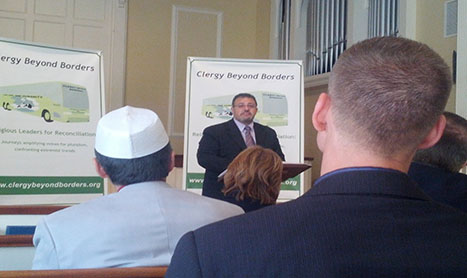ANNAPOLIS – Clergy Beyond Borders, a nonprofit headed by a rabbi and an imam, began a 10-city tour through Maryland Thursday morning in Annapolis to promote tolerance and compassion among religious groups.
The “We Are One Community Caravan” will tour until Sunday, beginning in Annapolis then stopping in Salisbury, Easton, Sunderland, College Park, Frederick, Hagerstown, Cumberland, Rockville and Baltimore.
Its president, Imam Yahya Hendi, and its executive director, Rabbi Gerald Serotta, will be giving speeches, holding panel discussions, attending luncheons and dinners and giving sermons with the goal of promoting interreligious dialogue.
In addition to promoting religious unity, interfaith communication and tolerance, the group wants to create “rapid response networks,” providing a way for people to respond to religious bigotry.
Nearly one in five hate crimes in the U.S. in 2011 was religiously motivated, according to an FBI report. Thirteen religious hate crimes occurred in Maryland that year, eight of them in Montgomery County.
The purpose of the tour is not only to spread a message, Hendi said, but to create a sustainable network of 50 to 60 people — mainly clergy — who can foster interfaith discussions and respond to religious conflict.
The response process hasn’t been defined, Hendi said.
“I do not want to dictate anything. They have to decide how they want to do it. Let them sit together, meet and talk about how,” Hendi said.
Nazir Harb, program coordinator for the organization and a graduate student at Georgetown, said the networks could take the shape of a 24-hour hotline, a smartphone application or an office, but “this has not been decided.”
Religious leaders prayed and sang in English, Hebrew and Arabic at the First Presbyterian Church in Annapolis.
But religious pluralism is incongruous with some religions’ doctrine, said Rick Wade, a Christian apologist, a person who verbally defends the Christian doctrine.
Wade understands the appeal of the belief that everyone — despite their beliefs — has salvation available. But pluralism can and does trivialize a specific religion, he said.
“It diminishes their zeal. It diminishes the confidence in their doctrines,” Wade said.
But for Clergy Beyond Borders, religious pluralism is not a concession that all religions are valid paths to God. Instead, it is the promotion of interreligious dialogue and tolerance, one of the campaign’s goals.
“In language, there are two words: united and uniformity,” Hendi said. “We are not calling for uniformity. We are rather calling for unity. Uniformity means, ‘let us all become one. Let us all compromise on the uniqueness of our traditions’… I say, ‘no, no, no.’ ”
Clergy Beyond Borders was founded by Hendi — its president — in 2008 to respond to interreligious conflicts through peaceful dialogue.
The staff and board of directors consists of four reverends, four imams and four rabbis.
Hendi, who was born in Palestine, has been friends with Serotta for about 16 years.
“We must not allow bad experiences, however bitter, however painful they are, to paralyze what we could do in the future,” he said.

